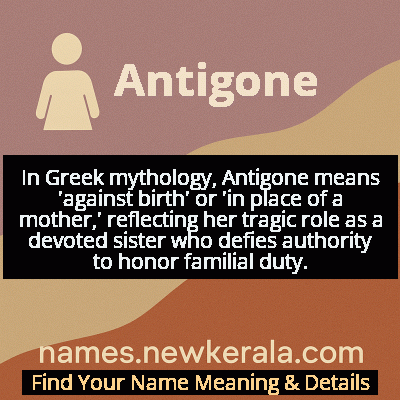Antigone Name Meaning & Details
Origin, Popularity, Numerology Analysis & Name Meaning of Antigone
Discover the origin, meaning, and cultural significance of the name ANTIGONE. Delve into its historical roots and explore the lasting impact it has had on communities and traditions.
Name
Antigone
Gender
Female
Origin
Greek
Lucky Number
4
Meaning of the Name - Antigone
In Greek mythology, Antigone means 'against birth' or 'in place of a mother,' reflecting her tragic role as a devoted sister who defies authority to honor familial duty.
Antigone - Complete Numerology Analysis
Your Numerology Number
Based on Pythagorean Numerology System
Ruling Planet
Uranus (Rahu)
Positive Nature
Strong sense of order, loyal, practical, and disciplined.
Negative Traits
Stubborn, overly serious, rigid, and prone to feeling restricted.
Lucky Colours
Blue, gray.
Lucky Days
Saturday.
Lucky Stones
Blue sapphire.
Harmony Numbers
1, 7, 8.
Best Suited Professions
Managers, engineers, accountants, organizers.
What People Like About You
Dependability, discipline, practicality.
Famous People Named Antigone
Antigone of Thebes
Mythological Figure
Symbol of civil disobedience and family loyalty in Greek tragedy
Antigone Costanda
Fashion Model
Miss World 1951 and international fashion icon
Antigone Kefala
Poet
Award-winning Australian poet exploring migration and identity
Antigone Nacach
Archaeologist
Significant contributions to Maya civilization research
Name Variations & International Equivalents
Click on blue names to explore their detailed meanings. Gray names with will be available soon.
Cultural & Historical Significance
Throughout history, Antigone has been reinterpreted across cultures and political contexts - from French resistance movements during WWII to civil rights struggles and feminist movements. Her character continues to inspire discussions about ethics, governance, and the power of individual conviction against collective oppression. In modern times, philosophers like Hegel, Kierkegaard, and Judith Butler have analyzed her significance, seeing in her story profound questions about gender, power, and the nature of ethical action. The name Antigone has become synonymous with principled resistance and the defense of human dignity against institutional power.
Extended Personality Analysis
Individuals named Antigone are often perceived as strong-willed, principled, and deeply loyal to their moral convictions. They typically possess a fierce sense of justice and are willing to challenge authority when they perceive injustice. Like their mythological namesake, they tend to be deeply family-oriented and protective of loved ones, often putting others' needs before their own. These individuals usually demonstrate remarkable resilience in adversity and maintain their integrity under pressure.
Their strength of character is balanced by a profound sense of duty and responsibility, making them reliable and trustworthy companions. However, this unwavering commitment to principles can sometimes manifest as stubbornness or an unwillingness to compromise, which may create conflicts in personal and professional relationships. They often inspire others through their moral courage and determination, and are frequently drawn to careers in law, social justice, education, or the arts where they can advocate for important causes. Their intelligence and depth of character make them compelling leaders and thoughtful friends.
Modern Usage & Popularity
In contemporary naming practices, Antigone remains a distinctive choice that conveys literary sophistication and historical depth. While never achieving mainstream popularity, the name maintains a steady presence particularly among families with Greek heritage, classical education backgrounds, or appreciation for philosophical names. According to naming statistics, Antigone appears most frequently in academic communities and urban centers with strong cultural institutions. The name has seen a slight resurgence in recent decades, influenced by feminist reinterpretations of the character and growing interest in mythological names. In Greece, the name is more commonly used and often appears in its shortened forms like 'Anta' or 'Tiggy.' Modern parents choosing this name typically value its associations with intelligence, strength, and moral courage, seeing it as empowering for daughters in an era increasingly concerned with social justice and female empowerment.
Symbolic & Spiritual Meanings
Antigone carries profound symbolic weight as a representation of the individual's struggle against unjust authority and the defense of fundamental human values. Her name has become emblematic of civil disobedience and the moral imperative to resist oppression, making her a timeless symbol for political and social movements. The burial of her brother Polynices against state orders symbolizes the universal human need to honor the dead and maintain family bonds, representing what Sophocles called 'the unwritten laws of the gods' that transcend human legislation.
Metaphorically, Antigone embodies the conflict between personal ethics and political power, serving as an archetype for anyone who must choose between obedience to authority and fidelity to their conscience. Her story continues to resonate in discussions about human rights, gender equality, and the limits of state power. The name also symbolizes the tragic but necessary cost of maintaining integrity in the face of overwhelming opposition, making it a powerful emblem of moral courage and the enduring human spirit.

